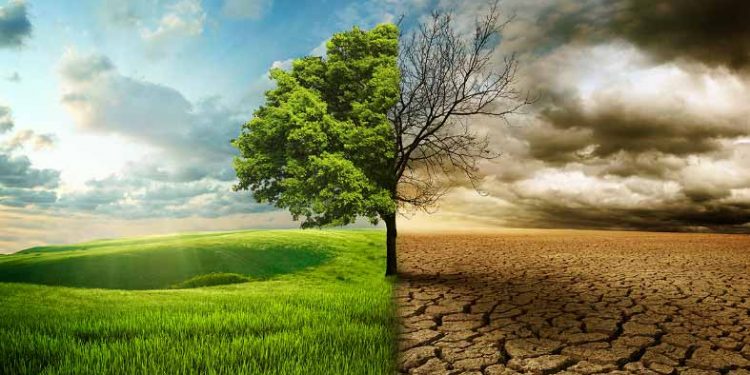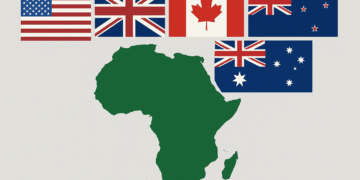Drought has been officially declared by the UK government on Friday. This announcement came, following months of low rain fail and record temperatures in many weeks in many parts of the country.
Basic Facts
- The British Government has officially declared a drought in parts of England after experiencing it’s driest year since 1976.
- England has experienced record low rainfall and extreme heat wave in the first half of the year.
- There is currently extreme heat in Europe, especially France, which has been battling wild fire since July.
What We Know
The British Government on Friday, officially announced drought following months of low rain fail and record temperatures across the UK.
The government said at a meeting of the Environment Agency “National Drought Group,” the drought trigger threshold had been met. From a report published by the agency this Friday, England as a whole had it’s driest July since 1935.
The UK’s meteorological authority said January to June 2022 recorded the least rainfall in England and Wales since 1976. The government in a statement said the move to drought status was based on factors such as rainfall, river flows and levels of groundwater reservoirs.
In July, NASA satellite images showed dried-up brown areas extending across most of Southern England and North Eastern coast.
Reports from the BBC suggest that the River Thames has dried up, and now flowing from a point several miles downstream.
Notable Quotes
Announcing the drought, the government agency, National Drought Group said,
“drought trigger threshold had been met” in parts of southwestern, southern, central, and eastern England.
“We urge everyone to manage the amount of water they are using in this exceptionally dry period,” National Drought Group chair, Harvey Bradshaw, was quoted as saying.
The Environment Agency and water companies “will step up their actions to manage impacts” and press ahead with their published drought plans, including things like hosepipe bans.”
Dominic Gardener, a farmer in West Sussex, told the BBC the dry weather was posing huge challenges for farmers.
“Everything is starting to struggle a bit – our grass is not growing at all – and livestock, we’re having to feed them extra food,”
Sir Keir Starmer, the UK Labour leader said, “the drought was “predictable” but “as usual we had no plan from the government”.
Environment Secretary George Eustice said, “no reason for people to be alarmed”
“The UK’s water supply remains resilient, we’re in a stronger position than ever” to withstand droughts, with progress made on leaks and infrastructure to move water between reservoirs.
Catch-up
Climate change has ensured that the frequency of environmental and climate questions will come more often and demand new answers or we face a worse crisis than the past.
The last time the UK experienced a drought was in the summer of 1976. The land cracked, gardens withered and reservoirs lay parched and bare. The impact on the British people, wildlife, farming and the landscape was quite disturbing.
A paper published in Nature in 1976, by two Met Office scientists stated that rainfall in England and Wales in the period 1971-1975 was the lowest for any five-year period since the 19th centuries (1850s). It was noted by the two MET officers that May 1975 to August 1976 was the driest since records began in 1717.
Warmth-loving insects were every where as their populations increased as first spring and summer blossomed. Insect-feeding birds were well supplied with food.
However, the losers during spring were the frogs, newts and toads, this was because, many of their breeding pools dried up. Badgers and moles struggled to find earthworms, which had retreated deep into the dry earth, where they could find moist. Blackbirds laboured to feed their young, and house martins had to search far and wide to find mud for nest building.
By the start of July, 1976, water rationing had become inevitable, an emergency powers bill was announced on 3 July 1976. The resultant Drought Act came into force on 6 August. The ACT banned hosepipes, the Act also had serious emergency powers to reduce or turn off domestic and industrial water supplies.
In South East Wales, the Brecon reservoirs dried up, the mains water supply was switched off for up to 17 hours a day. In East Anglia, the East Midlands, South Yorkshire and Devon were also severely affected. Standpipes (outdoor taps installed on streets to dispense water) were in use in many districts, one for every 20 houses. By late August, London had 90 days’ supply left, Leeds only 80. The slogan “Save Water, Bath with a Friend” appeared everywhere, and was wondrously lampooned.
With the drying up of rivers, fishes perished in their thousands, and many birds died of botulism, as disease built up in stagnant, de-oxygenated and nutrient-enriched water.
Farms struggled, as many were not connected to mains water supplies and their bore holes dried out. Strawberry crops shot over in the heat, while maize, cauliflower and sprouts failed altogether. The cereal harvest was low. The grass stopped growing, browned off so that farmers had to feed barley straw and hay to hungry stock, while providing thirsty animals with water became a difficult venture.
Road verge and railway line fires were commonplace, occasioned by cigarettes. From midsummer, wildfire became common place, hectares of forest were lost to fire.
The impact of drought had a potential effect on aviation as birds in their swam moving to new location risked bumping into plans on flight. Ladybirds were said to be biting people. The starving ladybirds were seeking, for moisture and food.
Takeaway
Perhaps, this is another effect of climate change. It’s also a wake up call for climate and meteorological agencies of nations and government to have better plans on how to tackle climate related challenges without letting a crisis happen.
If the developed west feels the impact of climate change as this, what would happen if an already security threatened Nigeria were to experience severe weather challenge?
Clariform Intel team will therefore use this opportunity to call on authorities in Nigeria and around the world to learn a thing or two from the UK as they navigate through this period, so we won’t be caught napping in times of environmental challenges.
This is even as we will like to ask, what arrangements have been put in place for expected flood as announced earlier in the year by Nigerian Government agencies.
State Governments also need to collaborate with the centre in planning for emergency rather than the practice of seeing ecological fund as a “shopping allowance” that ought not be accounted for.












